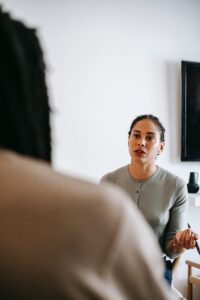“Listening is an art that requires attention over talent, spirit over ego, and others over self.” – Dean Jackson (American songwriter)
Many people enter conversations with predetermined goals in mind, whether they want to be heard or not, and ultimately to escape the engagement. People rarely listen to those who talk to them as they do not give their full focus, interest, or heart to hearing and understanding them. This not only causes isolation within, but it also causes the other person to feel disconnected.
Giving anything your full attention is what it means to listen. There are many different ways to pay attention to anything, which implies that when attention is diverted, listening skills are compromised.
Listening as a skill
One cannot become a good listener by remaining silent and letting others speak the majority of the time. Additionally, being good at speaking and hearing what the other person has to say does not necessarily translate into being a good listener. A good listener must be patient, open-minded, responsive, non-judgmental, and refrain from filling in any blanks or assuming they fully comprehend the other person.

Photo source: Alex Green
How to become a good listener
The art of listening can be learned in many different ways. Here are five strategies for using this important life skill in daily life.
-
Engage in eye contact
This is a very basic but frequently ignored rule of mastering the art of listening. When the speaker is talking and there is no eye contact, it gives the sense that the speaker is not taken seriously. In essence, it seems as though what they are discussing is unimportant.
-
Try not to interrupt the speaker
Talking should be avoided while someone is expressing themselves or making a point. To learn the art of listening, you must put any positive ideas on hold and give the other person the space and time they require to complete their sentence. Most of the time, people just need someone to talk to and not someone to jump in with their ideas. The intention is for them to receive attention, not for you.
-
Affirm your comprehension
Nod your head in agreement when someone is speaking to you to demonstrate your comprehension. A response can also be used to demonstrate that the speaker has your attention. Despite how insignificant it may seem, it is crucial to show some interest and understanding.
-
Without passing judgment, pay attention
Withholding criticism or other negative judgments is crucial if you want to acquire the skill of listening. As much as you can, try to be receptive. Being aware of the particular phrases, expressions, or circumstances that make you stop listening—your “turn off” triggers—also helps. You can avoid shutting off in the future with this method.
-
Pay attention to nonverbal cues
The majority of communication is nonverbal. It is vital to comprehend what the person’s body is saying to decide whether to support the speaker more, be more encouraging, or open oneself up more. For instance, it is essential to know whether their actions and words are consistent.
Self-respect is necessary for developing the ability to listen
It is important to realize that listening intently to everyone is not necessary as it can be draining. Selecting who to listen to is very acceptable. To do this, you must pay close attention to your needs and those of others while also being willing to create boundaries when necessary.
Self-respect is necessary for listening, both toward oneself and others. You do not have to be a therapist for everyone, however, you should be aware of how effective listening may make a difference in how you feel about yourself and how life works.
Is this article helpful? Kindly leave your messages in the comments below and share the article with family and friends. Visit our website @www.dominiontv.net for more content on inspired and empowered living.

